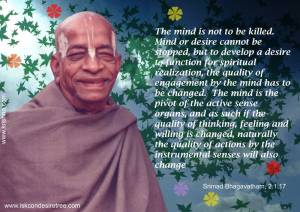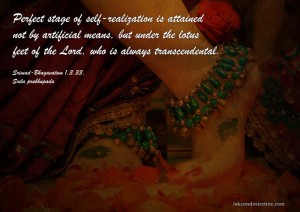Hare Krishna.
16th October, 2014. Gurgaon
My mind was in an agitated state since last almost one week. It was mostly to do with some glaring shortcomings which manifested out from my heart, most glaringly during this most holy month of Kartika. Seeing all these anarthas inside my heart first shook me as I thought I had left them for good. I went gloomy for a couple of days and then it took a simple verse and one line in its purport to calm my agitation. The verse was BG 2.70 from Bhagavad Gita sent by HG Padmalocan Prabhuji from Singapore.
Translation:
A person who is not disturbed by the incessant flow of desires – that enter like rivers into the ocean, which is ever being filled but is always still – can alone achieve peace, and not the man who strives to satisfy such desires.
Purport
Although the vast ocean is always filled with water, it is always, especially during the rainy season, being filled with much more water. But the ocean remains the same – steady; it is not agitated, nor does it cross beyond the limit of its brink. That is also true of a person fixed in Kṛṣṇa consciousness. As long as one has the material body, the demands of the body for sense gratification will continue. The devotee, however, is not disturbed by such desires, because of his fullness.
I realised that as long as I have this material body, desires will continue to come (and test me), rather than feeling morose I should see what my reaction is and even if I am able to catch my faults a little later it is still better than not being aware of them. I am in a practicing stage and it is a big mistake on my part to
1. assume that my anarthas have started reducing and things are getting better.
2. become complacent in my sadhna bhakti and think all is well
3. not to pray every single day to previous Acharays to protect me from Maya.
4. drill deep inside me that on my own I can not achieve anything in the spiritual life.
5. keep on practicing to be always be in the mood of a servant and remain humble with everyone be it my family, office, not just devotees.
6. And lastly I should stay away from any arguments/debates with Mayavadis at this stage.
What desires I had and what happened will take a lot of unnecessary space but you will get the clear idea as I post below prayer. It was all primarily to do with material desires, expecting honour, unnecessary urge for knowledge, lack of time for spiritual reading and a general frustation with the material life. As I searched in my mind for a prayer today morning, fit for my current state of mind, I somehow remembered the Manaḥ-śikṣā by Srīla Raghunatha Dasa Gosvamī. I love this prayer, HG Damodar Prabhu took few classes in Gurgaon and they were all eye openers for me and by some causeless mercy I remember it. They are also favourite of HH Sacinanadan Maharaj and I still remember his vivid description of verse no. 7 in one of Maharaj’s retreats. I am copying verses 5, 6 & 7 below along with a brief commentary which I am copying from whatever I read or heard from the senior devotees, they are not my realisations.
verse 5 Translation
“Lust, anger and so on are a band of dacoits who assail one suddenly on the open road of material life. They have bound my neck licentiously with the torturous, dreadful ropes of wicked deeds and are thus killing me.” O mind, speaking in this way, you must grievously cry out to the powerful and merciful devotees who are the protectors of the path of devotion leading to Śrī Kṛṣṇa, the killer of Bakāsura. Hearing your piteous cry, they will surely protect you from such a condition.
Comments:
The contamination of our heart can only be removed by the influence of association with Vaiṣṇavas who are free from all the pride and after we get their mercy then the heart can very easily be cleansed of all disturbances.
HG Damodar Prabhu told us that we should cry aloud for Srila Prabhupada under such situations. I had forgotten it and I did it today and will pray that I remember this instruction for the rest of my worthless life.
Verse 6 translation
O wicked mind, although you adopt the path of sādhana, you imagine yourself purified by bathing in the trickling urine of the great donkey of full-blown deceit and hypocrisy. By doing so, you are simultaneously burning yourself and scorching me, a tiny jīva. Stop this! Delight yourself and me by eternally bathing in the nectarean ocean of pure love for the lotus feet of Śrī Rādhā-Krishna.
Comments:
Overt or covert deceitfulness and hypocrisy which are present in a devotee, even after adopting the path of sadhana, are compared to the urine of a donkey. Considering oneself to be engaged in bhajana while remaining devious and hypocritical at heart is like considering oneself pure by bathing in the filthy, burning urine of a donkey. We should carefully disregard this danger.
As a Sadhaka we should learn to become honest with our own self. Otherwise, by resorting to deceitfulness, he is sure to slip down. Some examples of such manifestation: indulging in sense enjoyment on the pretext of sādhana-bhakti, serving wealthy and influential materialists instead of unpretentious devotees, accumulating wealth beyond one’s needs, having great enthusiasm for futile, temporary enterprises, indulging in illogical arguments on the pretext of cultivating knowledge, making an external show of strict adherence to rules and regulations but remaining inwardly attached to material subjects, preferring the association of philanthropists, mundane scholars, yogīs and materialistic people to that of resolute, loving devotees.
Instead One is here advised to bathe in the ocean of nectar that consists of divine spiritual transformations born out of love for the lotus feet of Sri Radha Giridhari.
Verse 7 Translation
O mind, how can pure divine love appear in my heart as long as the shameless dog-eating, outcaste woman of the desire for prestige is audaciously dancing there? Therefore always remember and serve the immeasurably powerful commanders of the army of Śrī Kṛṣṇa, the beloved devotees of the Lord. They will at once banish this out-caste woman and initiate the flow of immaculate vraja-prema in your heart.
comments :
The desire for prestige is an audacious, dog-eating, out-caste woman. The desire for honour and distinction is called pratiṣṭhāśā. Although all other anarthas may be dispelled, the desire for prestige is not easily removed. From this, all kinds of deceit and hypocrisy arise and are gradually nourished. The desire for prestige is called shameless, for although it is the root of all anarthas, it fails to acknowledge its own fault. It is also called cāṇḍālinī, a female dog-eater, for it is engaged in eating the dogmeat of fame.
A sadhaka yearns to be recognised as virtuous, benevolent and free from all sin. The sadhaka thinks, “I am a devotee of Krishna, I understand things clearly, and I am not interested in any material enjoyment.” In this way he nourishes the desire to expand his fame.
As long as the desire for honour and distinction has not been driven from the heart, deceit will remain; and until one becomes free from deceit, he cannot obtain pure, unalloyed divine love.
The words prabhu-dayita in this verse means those who are extremely dear to Lord Krishna. The word `atula’ means “that which has no comparison”. The word sāmanta means “a general or commander of an army”. Always serve the powerful generals of the army of Krishna’s devotees. Their mercy is unparalleled and they are very dear servitors of Lord Krishna. The divine rays of hlādinī-śakti are reflected in the hearts of pure Vaiṣṇavas. From their hearts, these rays of hlādinī-śakti are transmitted into the hearts of other faithful sādhakas, thus dispelling the anarthas of wickedness, deceit and hypocrisy and manifesting love for lord Krishna. The embrace of pure Vaiṣṇavas, the dust from their lotus feet, the water that washes their feet and their instructions are all fully competent to cleanse our heart. Therefore in the Padma Purāṇa, worship of the Vaiṣṇavas is declared to be even higher than the worship of Bhagavān:
[Śrī Mahādeva said:] O Pārvatī, the worship of Śrī Viṣṇu is the highest of all different types of worship. But even superior to that is the worship of His devotees.
In Śrī Caitanya-caritāmṛta (Antya-līlā 16.60–1) it is said:
The dust of the lotus feet of devotees, the water that washes their feet and the remnants of their prasāda – these three are very powerful. By honouring these three, one attains love for the lotus feet of Śrī Kṛṣṇa. This has been proclaimed in all the scriptures again and again.
Hence the above verse concludes that the beloved devotees of Lord Krishna are the incomparably powerful generals of the Lord’s army. By serving them all anarthas are eradicated very easily and it also generates the divine love for Sri Radha Krishna.
I request all serious devotees to please read and meditate on this most wonderful prayer by Sri Raghunath Dasa Goswami. Please read or hear its commentary by a senior devotee, there are many lectures/ seminars on Iskcondesiretree on it, it will be difficult to understand its complete meaning by our own effort.
So after going through many waves of agitation my mind is now peaceful. And after thinking and reading this wonderful prayer made me aware to always remain alert for attack from the material desires and in case of such feelings I need to cry out to my guru and Srila Prabhupada… loudly ! And to further protect myself I must serve vaishanavas to the best of my ability and I should always remain hungry for their association.
All glories to the most merciful devotees of Lord Krishna.
All glories to Sri Guru and Sri Gauranga.
All glories to Srila Prabhupada.


